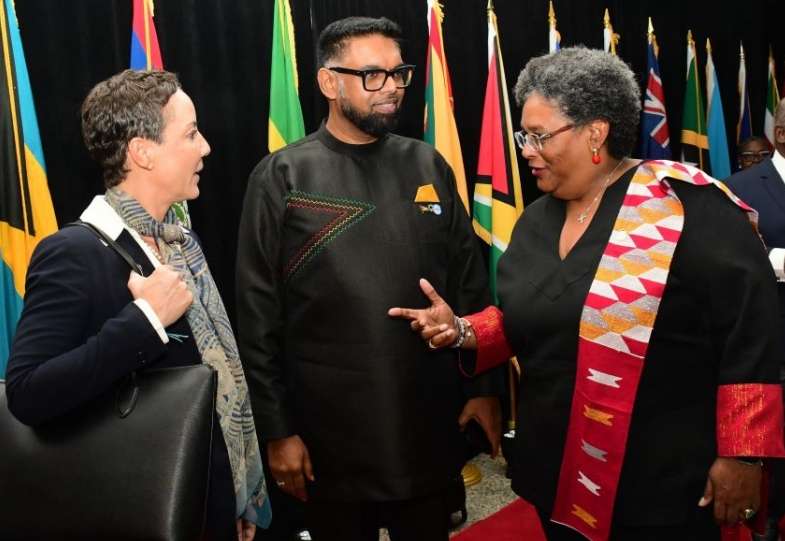Mottley Urges CARICOM Reform at Barbados Summit
The 48th Regular Meeting of the Heads of Government of the Caribbean Community (CARICOM), convened in Bridgetown, Barbados, served as a critical platform for regional leaders to address the pressing challenges confronting the Caribbean region. Prime Minister Mia Amor Mottley of Barbados, serving as CARICOM Chair, delivered a potent message, emphasizing the imperative to move beyond “business as usual” and embrace transformative change. She underscored the confluence of global crises, including the climate crisis, geopolitical conflicts, and economic instability, which disproportionately impact small island developing states like those within CARICOM. Mottley’s call for unity and decisive action resonated throughout the summit, setting the stage for crucial discussions on a range of interconnected issues.
Mottley identified a cluster of interconnected challenges demanding immediate attention. The escalating climate crisis, with its attendant threats of rising sea levels, extreme weather events, and disruptions to fragile ecosystems, poses an existential threat to the Caribbean. Coupled with this, the region grapples with persistent socio-economic issues, including high living costs, a struggling education system, food insecurity, and escalating crime rates, particularly gun violence. Freedom of movement within the CARICOM region, a cornerstone of regional integration, remains incomplete, hindering economic opportunities and cultural exchange. The Prime Minister’s frank assessment highlighted the urgent need for collective action to address these multifaceted challenges and build a more resilient and prosperous Caribbean.
Central to Mottley’s message was the need for reform within CARICOM itself. She emphasized the importance of securing independent funding mechanisms to ensure the organization’s financial stability and autonomy in pursuing its developmental agenda. Furthermore, she called for a reassessment of CARICOM’s governance structures to enhance efficiency, effectiveness, and responsiveness to the evolving needs of member states. This internal reform, Mottley argued, is essential to strengthening CARICOM’s capacity to navigate the complex global landscape and effectively advocate for the interests of the Caribbean on the international stage.
The situation in Haiti emerged as a significant focus of the summit. United Nations Secretary-General António Guterres announced his intention to propose that the UN assume greater responsibility for the multinational force supporting Haiti, including covering structural and logistical costs. This signaled a potential shift in the international community’s approach to supporting stability and security in the beleaguered nation. Prime Minister Mottley confirmed that elections in Haiti were scheduled for November 15, but expressed deep concern over the deteriorating conditions on the ground. While other CARICOM leaders voiced their hopes for improvement in Haiti, concrete solutions from the regional body remained elusive. The Haiti crisis underscores the complexities of regional security and the need for a coordinated and sustained approach to address the root causes of instability.
The 48th CARICOM summit, themed “Strength in Unity: Forging Caribbean Resilience, Inclusive Growth, and Sustainable Development,” provided a forum for in-depth discussions on these pressing issues. The closed-door business sessions allowed for frank and candid exchanges among regional leaders, laying the groundwork for collaborative strategies to advance the Caribbean’s shared interests. The summit’s focus on unity underscores the recognition that collective action is essential to overcome the challenges confronting the region and build a more sustainable and prosperous future.
The summit’s outcomes will shape the direction of CARICOM’s work in the coming years. The emphasis on reforming the organization’s internal structures, securing independent funding, and addressing the interconnected challenges of climate change, socio-economic development, and regional security signals a commitment to transformative change. The discussions on the Haiti crisis underscored the need for a coordinated regional and international response to address the complex challenges facing the nation. The summit served as a crucial moment for Caribbean leaders to reaffirm their commitment to regional integration and collective action in the face of unprecedented global challenges.
Share this content:












Post Comment